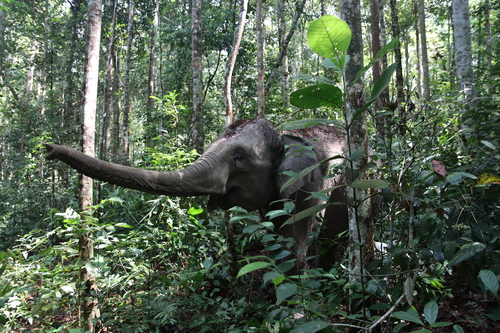
The Gentle Giants of Sumatra: A Species on the Brink
Sumatran elephants are one of the subspecies of the Asian elephant, and native to the
Indonesian island of Sumatra. They are mainly found in Sumatra forests in the province
of Riau, West Sumatra, and Lampung. Besides forests, many can also be found in
government conservatories. These herbivores tend to be sociable animals and need
large areas of land with enough food and shelter for populations to flourish. Females
travel and gather in groups, looking after one another whilst the males live solitarily.
Sumatran elephants are considered as the most distinct of all the Asian elephant
subspecies. In particular, it has 20 pairs of ribs, compared with other Asian subspecies
with 19 pairs and African elephants with 21 pairs. They have lighter skin colour and are
the smallest elephant subspecies, but have larger ears and longer tusks than other
Asian elephants. Despite their smaller size, Sumatran elephants can still grow up to 2–3
metres in height and weigh as much as 5 tons. With proper conditions, they can live for
around 70 years in the wild.
Elephants use their trunks like a hose to spray water across the body during bathing. To
help protect the skin from parasites and biting insects, elephants play in mud or spray
dust on their wet skin. Once the mud and dust is dry, elephants rub themselves against
a hard surface to remove any parasites.
As elephants mature, they become more dominant. They view their dominance based
on their size, weight and thus, the younger elephants would see themselves as more
inferior to the older ones. Additionally they are highly social with a range of behaviours,
as well as intellectual animals.
They sleep for about approximately four hours a night. About two hours of that are spent
standing. When they are awake, they spend their time constantly finding food. They eat
grasses, leaves, shrubs, fruits and roots depending on the season and their habitat.
When it is a particularly dry season, elephants will eat more woody parts of trees and
shrubs like twigs, branches and barks. These gentle giants consume approximately 150
kg of plant matter each day. Elephants only digest and absorb about 44% of the food
they eat and excreted around 50 kg of poop in a single day. Sumatran elephants feed
on a variety of plants and deposit seeds wherever they go, contributing to a healthy
forest ecosystem.
In 2012, the Sumatran elephant was changed from “Endangered” to “Critically
Endangered” because half of its population has been lost in one generation. Currently,
there are only around 2,400 – 2,800 populations of Sumatran elephants in the world.
This decline in the population is mainly caused due to habitat loss, where nearly 70% of
the habitat has been destroyed in one generation, and human-elephant conflict, where
elephants often come into conflict with humans due to rapid deforestation in Sumatra
which often leads to retaliation through poisoning or shooting. Sumatran elephants are
predicted to become extinct within 3 decades unless immediate steps are taken.